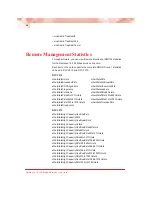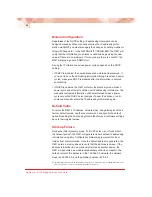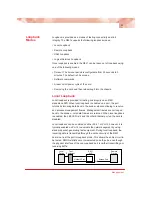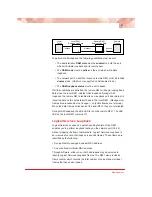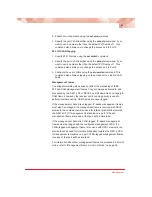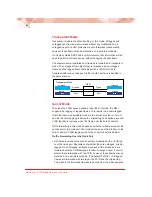
Radiance 10/100 Mbps Services Line Card
32
Remote Loopback
Remote loopback is only applicable when two R821 cards are in a back-
to-back configuration and they are being managed by the R502-M
management card. Remote loopback is performed on one of the ports on
the remote R821. When remote loopback is enabled on a port, the port
returns its incoming data back to the sender, while continuing to receive
and process management frames. Management frames are not looped
back to the sender—only data frames are returned. During remote
loopback, the LBK LED on the remote R821 is lit and its non-loopback
port is disabled. The LBK LED on the local R821 remains off.
Remote loopback can be enabled on either Port 1 or Port 2, however, it
is typically enabled on Port 2 to evaluate the data flow using standard
packet-generating test equipment, as shown in the illustration below.
During remote loopback, the incoming data is transmitted through the
entire circuitry of the remote R821 board, not just the port in loopback.
This allows the entire circuit to be tested. RMON statistics are incre-
mented on both ports, even though the physical interface of the non-
loopback port is neither transmitting nor receiving traffic.
OAM Loopback
OAM loopback is only applicable to when two R821 services line cards
are in a back-to-back configuration with both cards connected through
their network ports. By using the 802.3ah management channel, OAM
loopback is initiated from the local R821 and performed on the remote
R821. During OAM loopback, data on the fiber line is looped at the
remote R821, returned to the local R821, and terminated there.
Because the data stream is stopped at the local R821, you do not need
any external test equipment to determine the quality of the network
segment. Instead, you can simply view the counters for the two services
line cards to see if the data is passing properly.
Local
R821
Access Port
Local
Device
Remote
Device
Access Port
X
Test
Equipment
Network Port
Remote
R821







